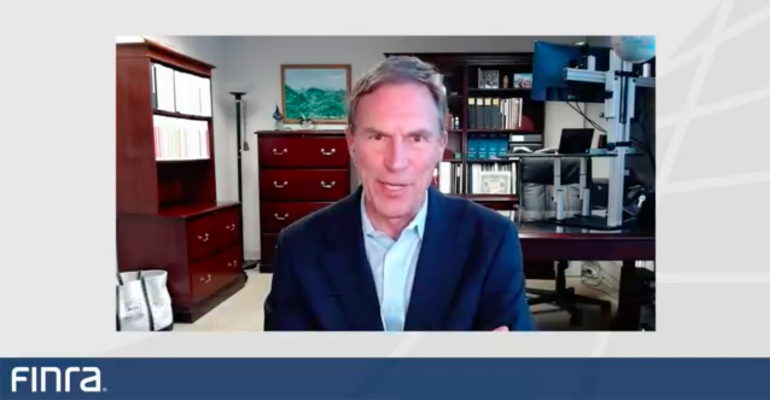FINRA is working with the SEC to see if the temporary relief that allowed firms to conduct office inspections remotely during 2020 and 2021 can be extended through 2022, according to a FINRA executive during a panel at the regulatory agency’s annual conference this week.
FINRA Executive Vice President and Chief Legal Officer Bob Colby said a possible extension could “buy a little time” for firms and regulators to determine how inspections should be conducted over the long term. Colby took part in the conversation with several agency senior staff, with much of the dialogue centering on what had changed during the coronavirus pandemic, and what might remain when it abates.
The original guidance, published in the Federal Register in November 2020, said firms obligated to conduct an “inspection of an office of supervisory jurisdiction, branch office, or non-branch location” could satisfy the obligation without an on-site visit. The rule stated it was necessary because of the “compelling health and safety concerns and the operational challenges” firms had because of the pandemic and the ensuing rush to remote working.
Colby noted the agency previously released a regulatory notice on takeaways from the pandemic’s impact on business continuity plans, and said one thing the agency recognized is that "locations" such as an OSJ, branch or nonbranch office would need to be reconsidered if some form of remote or hybrid work becomes permanent for member firms. He also said the agency would need to work with state regulators as they shared definitions of these locations.
“States have warned that before they’ll be willing to agree to any sort of changes, we’re going to need to show that the concerns that have historically been there have been addressed, that we’re not leaving any gaps by which misconduct or inattention or errors could take place,” he said.
Many FINRA member firms are urging the regulator to allow remote inspections to continue permanently. Last December, FINRA asked firms about whether remote inspections should be extended, as well as if the agency should change its definitions for locations. Firms like Wells Fargo, Charles Schwab and Lincoln Financial Group were in favor of remote inspections, and Lincoln Senior EVP Will Fuller said that since many b/d functions could be done remotely, he expected many employees would not return to the office on a full-time basis. Others, including Mark Quinn, the director of regulatory affairs for Cetera Financial Group, said FINRA should consider making its own exams remote unless an on-site presence was deemed necessary.
But it would be hard to say definitively that remote working impacted the length of a FINRA exam process, according to Bari Havlik, an EVP, Member Supervision at FINRA. In some instances, conducting examinations remotely could actually speed up the process, as there’s no travel time involved. But the process can also become lengthier because more communication would be needed about what type of information was required.
“Sometimes some firms are not as cooperative as we’d like and expect them to be in responding to requests for information,” she said. “The on-site presence helps get communication in alignment between the firm and the examiner, and get responses more quickly.”
Havlik also said the agency was beginning its oversight into firms’ compliance during the previous year, noting the agency made a point of not immediately looking into how firms fared when they went fully remote at the start of the pandemic. Now, examiners were analyzing the effectiveness of firms’ oversight, with more information likely to come by the end of the year or early next year. Colby also said firms need to track new tech additions and developments to understand where work is being conducted by personnel, even if it is being done remotely.
“It’s an ever-growing, ever-changing regulatory effort,” he said.





